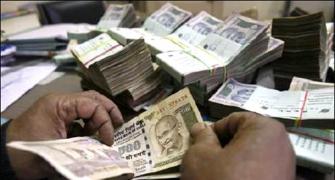The government has not done its homework or made any attempt to forge a consensus on this matter that affects millions of people in the organised sector, says Harsh Roongta.
 The government has tied itself into knots on reforms in the retirement and pension sector.
The government has tied itself into knots on reforms in the retirement and pension sector.
First, it proposed to tax up to 60 per cent of the accumulated Employee's Provident Fund (EPF) corpus, even if withdrawn after retirement.
After hue and cry, it was forced to retract. It also sought to lock-in the employer's contribution to EPF till the age of 58 years, even if the employee lost his job or he needed the money desperately.
It has been forced to withdraw this proposal as well, after violence erupted on the issue in Karnataka. Hopefully, this move will be dropped altogether.
Clearly, the government has not done its homework or made any attempt to forge a consensus on this matter that affects millions of people in the organised sector.
Why does the government feel it is justified in interfering with the administration of retirement monies?
After all, it belongs to the subscribers themselves.
The justification is primarily derived from twin sources.
In the context of the EPF, we must remember the Act was enacted in 1952.
In those days, the employer's contribution was payable over and above the agreed wages and thus, a benefit measure wrung out from the "reluctant" employers by the government through the law.
The EPF Act provides the right to charge a penal interest in case the employer delayed payment of PF and even imprisonment in case of non-payment of EPF "dues".
Providing this benefit gave a right to the government to interfere with the way this money was invested or withdrawn by the subscriber.
Things are different now. Compensation today is based on a 'cost to company' basis.
Hence, employer's contribution to EPF means that the employer pays that much lower wage to the employee concerned.
Effectively, the employee is paying even for the so-called 'employer's contribution', along with a compulsory matching contribution.
This change is recognised implicitly in the PFRDA Act, under which the Pension Fund Regulatory and Development Authority (PFRDA) was set up to regulate the National Pension System (NPS).
The penal and enforcement provisions are considerably milder, as compared to those in the EPF Act, 1952. And, there are no provisions for imprisonment for non-payment of "dues", unlike the EPF Act.
Despite this, the labour ministry and trade unions which control the EPFO together, continue to believe getting the employer to contribute their share is a major benefit that they have managed to get on behalf of employees.
They also believe this money must be protected even from the employee himself, who is likely to blow up this "hard gotten" money if he is allowed unhindered access to it.
This attitude is clearly at display in the latest missive from the labour ministry which "allows" access to the subscriber to his own money if it is needed for buying a house, getting a child married and pursuing specified professional education and health care.
The second justification comes from the tax benefits the government extends.
This is a more legitimate ground. But, this interference should be limited to recovering the tax initially forgone in case of premature withdrawals.
Also the tax forgone argument applies to a very small percentage of EPF subscribers who fall in the tax bracket.
The other subscribers don't pay any income tax at all.
The government should initiate a debate to arrive at a consensus on pension reforms, including preferential tax treatment.
Any other way is bound to fail and alienate the very class on whose support it rode to power in the first place.
The writer is a Securities and Exchange Board of India-registered investment advisor.










